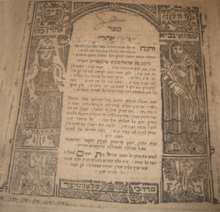Aaron ben Samuel
Rabbi Aaron ben Samuel of Frankfurt (Oder) (Hebrew: רבי אהרון בן שמואל; c. 1620 - 1701) was a 17th-century Jewish-German Hebrew rabbinical author. [1]
Aaron ben Samuel | |
|---|---|
 Front page of Bet Aharon | |
| Personal | |
| Born | Aaron ben Samuel 1620 |
| Died | 1701 |
| Religion | Judaism |
| Nationality | German |
| Children | (1) HaRav Abraham ben Aaron
|
| Parents |
|
Biography
Possibly born in Frankfurt an der Oder, Germany in about 1620. Not much is known about Rabbi Aaron's personal life. His father Rabbi Samuel was a minor rabbi in Leipzig. Rabbi Aaron published "Bet Aharon" (lit. Aaron's House) at Frankfort-on-the-Oder in 1690, being at that time of advanced age. In the introduction he states that he spent ten long years writing the work, with the help of several other scholars who lived with him for this purpose. In this introduction Rabbi Aaron additionally mentions three of his other works, which, however, seem to have been lost: (1) Sissera Torah - a midrashic commentary on Judges. (2) Ḥibbur Masora - a midrashic commentary on the Masora, of which he gives several specimens. (3) Shaloaḥ Manot - a short commentary on the treatise Megillah. His work, "Bet Aharon" was received with the approval of the greatest rabbinic authorities of the time. The work assembles all biblical passages cited or explained in the Talmud, the midrashim, and the many religious-philosophical, homiletic, and kabbalistic writings, with exact references for each quotation. The work was published again in the 1780 Vilna and Grodno edition of the Nevi'im and Ketuvim. An enlarged edition by Abraham David Lavat appeared under the title "Beit Aharon ve-Hosafot" in 1880. At the request of his wife, Rabbi Aaron translated into Yiddish the Midrash Petirat Moshe, published in 1693 in Frankfurt on the Oder. This work seemed to be popular among women in Poland and Russia. Rabbi Aaron also wrote a commentary on Perek Shirah which appeared as an appendix to the 1701 Berlin prayer book. Rabbi Aaron died in 1701 in Frankfurt an der Oder. His eldest son HaRav Abraham ben Aaron (1640-1712) served as the Av Bet Din of Frankfurt an der Oder and his second son Rabbi Eliezer ben Aaron (1645 - 1716), was the rosh yeshivah of the Frankfurt an der Oder yeshivah as well as a minor Halakic commentator.[2][3][4][5]
References
- Zedner, Joseph (1867). Catalogue of the Hebrew Books in the Library of the British Museum (in iw). Trustees of the British Museum. p. 5.CS1 maint: unrecognized language (link)
- "Aaron ben Samuel | Encyclopedia.com". www.encyclopedia.com. Retrieved 2020-06-12.
- "AARON BEN SAMUEL - JewishEncyclopedia.com". www.jewishencyclopedia.com. Retrieved 2020-06-12.
- "Rabbi Eliezer ben Aaron of Frankfurt (Oder)". geni_family_tree. Retrieved 2020-06-12.
- Heller, Marvin J. (2010-12-07). The Seventeenth Century Hebrew Book (2 vols): An Abridged Thesaurus. BRILL. p. 1157. ISBN 978-90-04-18956-0.
![]()